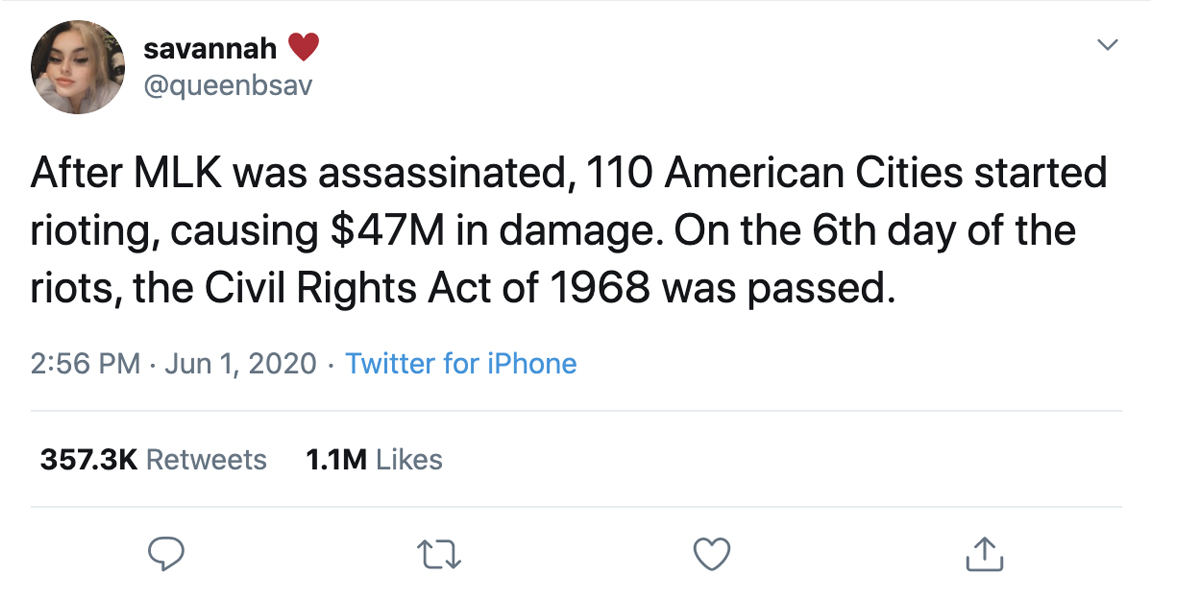The events of the last few weeks unfolded in real-time on Twitter, on TV, over the radio and through text messages. Across the country, people tuned into reports from D.C., Minneapolis, Atlanta and Los Angeles, with emotions running high.
One common reaction wove its way through the clutter of news articles, opinion pieces and tweets: a craving for history to help us understand how we got to where we are, and how to find a way forward.
On television, social media and out on the street, I saw people wielding history like a tool, making claims about the past – not always accurate ones – and interpreting what it means for us today.
Atlanta-based rapper and activist Killer Mike opened a powerful speech with a reference to the Black World War II veterans who integrated Atlanta’s police department in 1948 and were forced to maintain aspects of segregation even on the force. Even though I grew up in Atlanta, with a childhood spent immersed in the history of the Civil Rights Movement since it is the focus of my father’s work, this was a story I hadn’t learned until last year.
President Trump’s own words about “looting” and “shooting” call back to the Civil Rights era, echoing those of Miami Police Chief Walter Hedley in 1967, whose forces met Civil Rights protestors with shotguns and police dogs.
On May 31, the 99th anniversary of the Tulsa Race Massacre, I saw many of my friends share that they were learning this piece of history for the first time.
And then there’s this tweet, which garnered over 1 million likes in 24 hours.

Conversations about history are happening all around us—on the radio, in backyards, on TikTok and Instagram stories, and in text messages. We’re grappling with a difficult present, one that stems from our cumulative action and inaction over 400+ years. People are eager to use the past to guide us forward. It can be revealing, even when it is also unsettling or tragic, to understand how things happened before, and what led us to today. And, frankly, I think we often look to history for hope and comfort. But how can we harness the power of the past to help us make better choices – to shape a future closer to the promise of our more perfect union?
At Made By Us, these are the questions we are working to answer. For the first time, we’ve brought over 65 organizations together with a mission to “power our future with history.” History is never a simple story—and no one museum can tell the full history of our country. It’s going to require that we cross boundaries, work together, and get comfortable with complexity.
Like everyone else in these uncertain times, I would love to turn to a familiar story with a beginning, middle and end. But history is complicated — or as our friends at the Atlanta History Center say, “history is messy.” We need to get comfortable with being uncomfortable, because as we invoke more voices and stories from the past, we will find a complexity and nuance there that belies any simple – or single – story.
History, like the present, involves real people who are flawed, who change their minds, who disagree with each other and react to each other, who themselves draw upon the past and present, and most importantly, who don’t know how it’s all going to work out. It is rarely neat around the edges, it’s composed of many conflicting voices, and it’s where those voices come in conversation with each other that the story is written.
If we can get comfortable with that complexity, if we can acknowledge that just like with justice and equality there is always more to learn and do, then we can equip ourselves with the power of the past to shape the future. When we see ourselves as part of history, and take on the agency that we give historical actors in the past, then it becomes clear that things don’t just “change” – people make them change.
We are part of the story, and our actions matter.
History museums have valuable resources to help here. But because the conversation is happening on the streets, on social media, and in the news media — and not least because we’re still in a pandemic, with many museum sites closed — history must reach beyond the walls of institutions. We need to meet people where the conversation is happening: in faith communities, in corporate boardrooms, in backyard barbecues, in protests and in the media, in children’s books and around the dinner table. And it must be paired with paths to action.
Museums are conveners of people and information — and as such, they can be sites of dialogue, organizing and action, even beyond our walls, even in the digital space, even now. That’s why we’re inviting you to contribute your vision for the future of the United States in a digital forum, MyWishForUS.com.
Our country began with a vision, and it has evolved over time thanks to the myriad visions from people like you and me, working to form a more perfect union. Articulating the new world we want to live in — in all of its complexity — is the first step toward making it a reality.
Caroline Klibanoff, Program Manager, Made By Us


